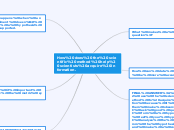How does the scientific method help scientists acquire information.
What makes a good question?
A good question is one that leads to another question.
If a question does not lead to another question, your experiment will just end there instead of having a new experiment to work on.
A good question is one that is based off prior knowledge. (what you already know)
If a question isn´t based on prior knowledge you won´t have any base for what your question is about. It will just be a random guess. An educated guess is better than a random guess.
A good question is one that can be tested.
If a question cannot be tested, you will not be able to find the answer.
A good question can be tested by an experiment.
If an object can be tested, but not by an experiment that you can use, you will not be able to get an answer yourself.
How can data collection be more accurate?
Using Significant figures
Significant figures are any nonzero number, a zero in between 2 nonzero numbers, and your 1 ¨guess¨ at the end. Non Significant figures are non zero numbers to locate the decimal and zeroes before the decimal point.
Use reliable sources
Use a reliable source that has been proven correct or that you have gotten right answers from before.
Testing an experiment multiple times
When you are testing an experiment multiple times so that you get the most accurate number or answer. Testing multiple times lets you know if you have an outlier or mistake.
FINAL ANSWER: Scientists use the scientific method to acquire information because it helps them make observations, ask good questions, form a hypothesis, test your hypothesis, analyze the data from the hypothesis, and make a conclusion.
What happens when an experiment doesn´t lead to a hypothesis being supported.
Go back through and rewrite a hypothesis
Use your evidence to support your hypothesis
Use your evidence to not support your hypothesis.
Use your evidence to generally support your hypothesis (with some exceptions).
Try the experiment again
Retry your experiment and see what your results are.
If you try the experiment again, you will get the best possible answer.
Use your results (data) to see whether or not your hypothesis is supported.
Look through your data to see if your hypothesis is correct.
Your hypothesis can lead to 3 main results.
The data supports the hypothesis
The data doesn´t support the hypothesis.
Your hypothesis generally supports it with some exceptions.
Why is it important to know the metric system.
193/196 countries use the metric system.
Only Myanmar, Liberia, and the United States use the customary system.
If you visit another country, you will know the system of measurement.
You can understand basic distances from 2 different measuring styles.
The conversions are way simpler than the customary system.
The conversions are all base ten.
They stick with liters, meters, and grams.
Instead of feet, yards, inches or cups, quarts, and gallons.
The prefixes stay the same for each category of measurement.
The prefixed are KHDBDCM.
Kilo, Hecto, Deka, Deci, Centi, and Milli.
INITIAL ANSWER: It helps them organize when and how to get their information, in an order.
It helps them organize when and how to get their information, in an order.
